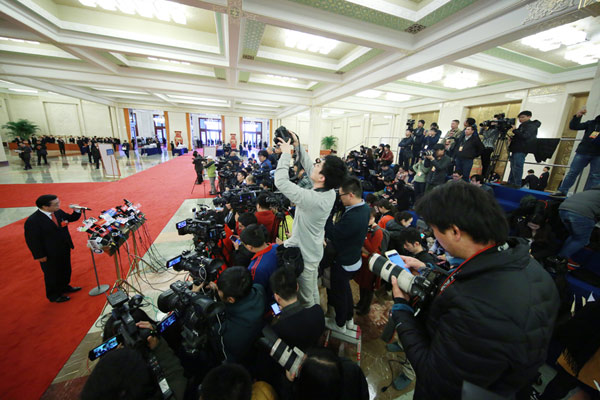
Journalists make face-to-face interviews with high-level officials along the 100-meter-long "minister's passage", also known as ministers' red carpet, at the Great Hall of People. (Photo: China Daily/Feng Yongbin)
More high-level officials of government departments spoke directly with the media during this year's "two sessions", or China's annual legislative and political consultative meetings, as the government strives to be more transparent.[Special coverage]
"I have covered the 'two sessions' for more than ten years. This year, more ministers took questions and their answers were straightforward and down to earth," said veteran journalist Zou Dezhi from China Education Television.
A total of 34 ministers were interviewed in the so-called "minister's passage", a 100-meter-long red carpet at the People's Great Hall, during the two-week-long annual political event.
On March 13 alone, a total of 11 ministers answered 23 questions from journalists, covering hot issues such as new energy vehicles and value-added tax reform, which makes it the single busiest day since the "minister's passage" was opened in 2007, said Zhu Hengshun, a staff member of the media center of the National People's Congress.
"A significant change this year is that more ministers voluntarily answered questions," said Zhu.
The interview session is usually arranged before and after the plenary sessions of the National People's Congress.
It is not an official media conference, but ministers receive a lot of attention from reporters due to their positions of influence.
In the past, journalists waited for ministers outside the main hall and chased them to ask for comments. Later, a separation line was put between reporters and ministers, and the interviewees were invited by designated reporters to answer questions in front of the media area.
Sometimes, however, ministers would simply go away without saying anything.
During this year's "two sessions", at the call of Premier Li Keqiang to respond positively to concerns of the public and send clear information to the public and market, more ministers proactively answered journalists' questions, even if they were pointed and sensitive ones, said Zhu.
"It is so convenient for us to communicate with Chinese ministers face to face in such a short time," said Meyer from French newspaper Les Dernières Nouvelles d'Alsace who has reported on the two sessions for more than two decades.


















































